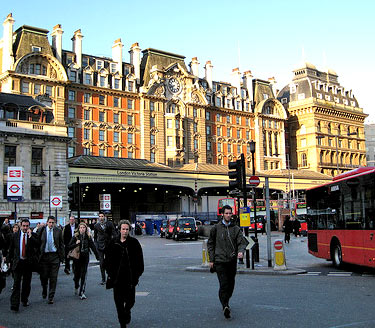Further Remarks on Eric Voegelin and Gnosticism
In my previous Brussels Journal essay on Jorge Luis Borges and Karen Blixen, I used the analysis of modernity undertaken by Eric Voegelin (1901-1986) as my critical framework. These current remarks constitute an extended footnote to the Borges-Blixen essay, in which I want to return to the text of Voegelin’s New Science of Politics (1952), particularly to its analysis of the Gnostic mentality, as that makes itself manifest on the contemporary political scene, and even more particularly to the book’s treatment of the Gnostic “second reality” or “dream world” in its remarkable Chapter 6, entitled “The End of Modernity.” I believe Voegelin to be central to any understanding of our condition.
Two Readers Reply to Borges, Blixen, and Voegelin
It pleases me a good deal that the citations from the work of Eric Voegelin – particularly from his New Science of Politics – in my recent Brussels Journal essay on Jorge Luis Borges and Karen Blixen appealed to the acuity of two Journal readers, the parties who identify themselves as “Wynne” and “Ribera.”
I first read Voegelin nearly thirty years ago at the moment when I began graduate studies at UCLA in Comparative Literature. The time was the mid-1980s, the watershed moment for postmodern thinking in North America due to the publication in English of books by Jacques Derrida, Michel Foucault, and a host of lesser Parisian radicals. In the proverbial blink of eye, the literature faculties and the cohorts of graduate students fixated on the weird syntax and abstract, rather threatening vocabulary of De la gammatologie and Les mots et les choses, which constituted, from that epoch, almost the sole object of interest in the reading-courses and seminars. Together, Voegelin and René Girard gave me the intellectual tools for understanding what I was seeing. Girard, a Frenchman but not a Parisian, would have called it a mimetic crisis, with literature and all normative views as the sacrificial victim under the pejorative of “Logocentrism.” Voegelin, who was more central to my understanding at the time than Girard, would have seen it as another manifestation ofmetastatic faith, or rather of a metastatic – or contagious – pseudo-faith pitting itself in contest with received tradition.
Britain And America Compete In Economic Suicide
Victoria Station is just a few blocks from Buckingham Palace and was for many decades the connecting station with the "Continent" (Europe) and the greater world, much like the large international airports of the present day.
The kings and queens of England would greet the various European royals and other heads of state at Victoria Station.
Most of the parts of the station that were built in the late 19th century are still there - the great steel trusses and the Victorian brickwork. In its time, it was state-of-the-art, befitting what was the superpower of its day. After World War I, the station slowly was allowed to decay, as was the British economy.
Beginning with the Thatcher reforms, England had a quarter-century run as the fastest-growing major economy in Europe, but still slower than that of the United States. Yet the basic structure of Victoria Station was only partially renovated during the good years, even though rail privatization and sleek new trains began to reinvigorate rail travel.






















